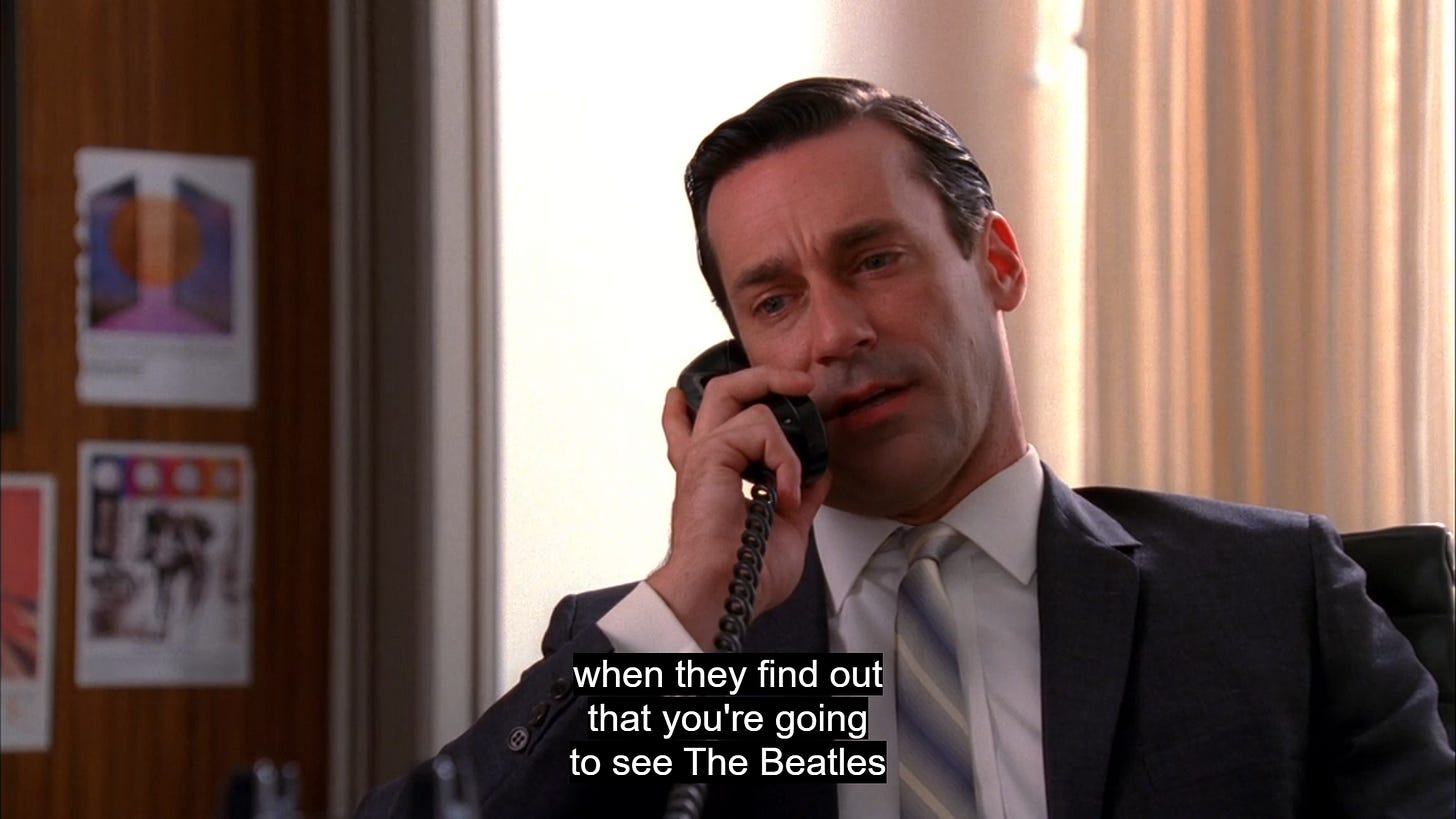Season 4: Episode 10
“Hands and Knees”
Written by: Jonathan Abrahams & Matthew Weiner
Directed by: Lynn Shelton
Setting: August 1965
“Do you want to know a secret?
Do you promise not to tell?
Whoa, oh, oh
Closer
Let me whisper in your ear
Say the words you long to hear
I'm in love with you
Ooh-ooh-ooh-ooh ooh”
- The Beatles, “Do You Want to Know a Secret” (1963)
I saw an interview in which series creator Matthew Weiner described the ultimate form of tension in Mad Men. It isn’t that the viewer knows something the characters don’t, it is that other characters know these secrets too.
Not a single character in Mad Men carries the burden of their past alone.
Pete, Betty, and Cooper know that Don Draper’s real name is Dick Whitman.
Peggy and Pete know that Pete’s child with Trudy will not be his first.
Joan and Roger saw each other so long ago that both have become nostalgic. Everything about the past seems better. What does the future hold besides more unknowns?
All decades offer this perspective but the 60s especially makes one question “What if?” What if JFK had lived, if we had never gotten involved in Vietnam, or if Nixon had not been elected? These possibilities still haunt us today but the facts of our history are unchangeable so why try and outrun them?
In “Hands and Knees,” Don may have to stop running not because he chose to but because his legs are shackled.
After SCDP applies for a government contract, Don knows the investigation for a security clearance will uncover his true identity. The only one who can save him is the very man who tried to use this information to destroy him almost five years ago.

While reflecting on the 60s can feel like chaos, Mad Men attempts to understand it through a feeling of destiny. The seeds for this episode were planted in Season 1 when Cooper advised Don following Pete’s attempt to have him fired. He suggests sparing Pete as “One never knows how loyalty is born.”
In retrospect, we know where the 1960s is heading. It’s still a show with cool outfits and Beatlemania but those elements do not exist within a bubble.
The present may feel chaotic and the future may look impossible, but the past is always understandable. Looking back, almost no one feels that Vietnam should have been conducted the way it was but, in the moment, many clung to the belief that there was light at the end of the tunnel.
Mad Men is a time machine that is not unburdened by what is to come. Even hearing about The Beatles playing at Shea Stadium, one’s thoughts might escape to the senseless murder of John Lennon 15 years later. These are scars the characters do not carry but that haunt us now.
They are brought to their hands and knees imagining the worst future and we are brought to our knowing the truth of what is to come.
In one of the most uncomfortable storylines of the season, Lane Pryce has begun a relationship with an African American Playboy bunny. What makes Lane’s new love uncomfortable is that he flaunts the relationship as a sign of his independence not just from his life but from the times. He is with this girl as an act of rebellion, to prove something not just to himself but to everyone.

The genius of Season 4 is, that for everything we do not know is to come, destiny is not clouded. There is never an illusion that Lane will leave his wife for a Playboy Bunny. We carry the knowledge of the unwritten and written future. While these characters may rebel against the times, they cannot escape them.
The future feels so obvious when you stop and look around.

While the viewer may not anticipate Lucky Strike leaving SCDP, it again feels obvious when you stop and look around. Is it not destiny that tobacco will one day have no place in advertising? Roger Sterling is holding onto a fading empire.
The past we held onto may seem silly in the years to come and even worse will be the future we avoided out of the comfort of the present.
Life changes daily and any attempt to deny that creates a reality no one can live in.

Joan decides against having an abortion that was expected of her. The deciding moment is when a mother asks Joan about her daughter, assuming that she is a mother escorting her child to have the procedure performed. Joan thinks about the possibilities that plague one during any painful crossroad. Whatever her path, this change is in her power and she chooses to have the child.
Everyone suffers weakness and will end up on their hands and knees. The question then becomes will you be known as the one who fell and stayed there or as someone who got up again, who asked for help?
“Help me if you can, I'm feeling down
And I do appreciate you being 'round
Help me get my feet back on the ground
Won't you please, please help me”
- The Beatles, “Help” (1965)
Enjoys seeing those loveable lads from Liverpool, Don. Don’t forget your earplugs.












